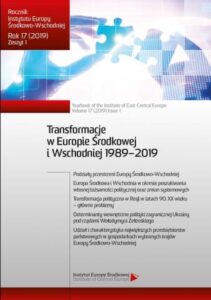ORCID: Artur Adamczyk: 0000-0002-5444-3670
Strony: 333-350
Wydanie: Lublin 2019
DOI: https://doi.org/10.36874/RIESW.2019.1.16
Sposób cytowania: A. Adamczyk, M. Karadzoski, Wyzwanie dla tożsamości międzynarodowej Macedonii – grecko-macedoński spór o nazwę państwa, „Rocznik Instytutu Europy Środkowo-Wschodniej” 17 (2019), z. 1, s. 333-350, DOI: 10.36874/RIESW.2019.1.16.
Słowa kluczowe: European Union, Greece, international identity, NATO, North Macedonia, Western Balkans
Abstrakt:
The main purpose of the article is to present how the Greek-Macedonian naming dispute influenced the problem of implementation the international identity of Macedonia. Despite the initial problems of the government in Skopje related to determining their international identity, Macedonians managed to define the principles regarding the identification of a new state on the international stage. As a small country with limited attributes to shape its international position, Macedonia has basically been determined to seek guarantees for its existence and security in stable and predictable European international structures such as NATO and the European Union. The main obstacle for Macedonians on the road to Euro-Atlantic structures was the veto of Greece, a member of these organizations, resulting from Athens’ refusal to accept the name the Republic of Macedonia. The Prespa Agreement of 2018 gave a new impetus to the realization of the international identity of North Macedonia.

PDF: Pobierz